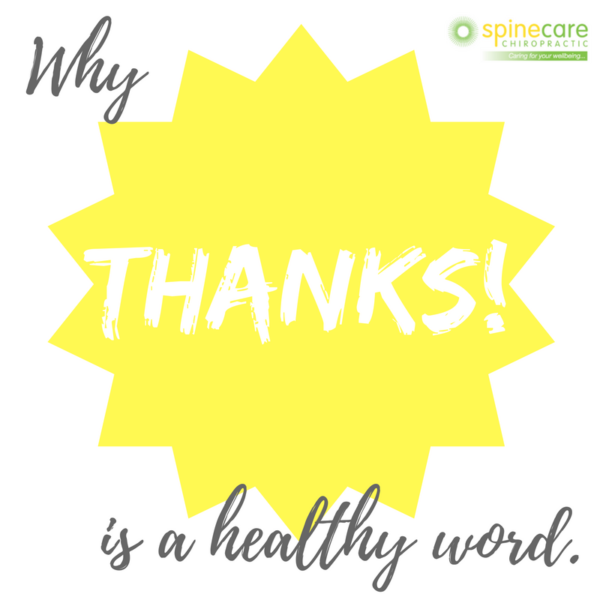Are you feeling grateful? Here are 8 reasons to practice gratitude.

Happy December! Happy Holidays!
Thanks so much for being part of our Spinecare community this year – and here’s to an even healthier, happier 2017. And now, Dr Will has a quick message for you!
Give yourself the gift of gratitude this Christmas! 8 proven ways gratitude does you good.
Gratitude is something we’re urged to practice young. Giving thanks at the dinner table. Minding our manners. Being grateful for what we have that others may not.
But it’s easy to see it as incidental, not active. A feeling that spontaneously appears, rather than one to be cultivated daily.
However, did you know that setting aside time to be grateful can measurably improve your health? It’s well-supported by science, and does so much more than inducing the warm-fuzzies.
Here are 8 proven benefits of gratitude [and how to build it into your day]
-
Better health and wellbeing.
Being thankful makes you healthier? It’s true! In fact, over 137 studies support the role of positive emotions in health.
There are many (and rather complicated!) reasons for this, involving the immune, hormonal, nervous and cardiovascular systems, as well as social and personal factors. The main thing you need to know is that a thank you a day most certainly keeps the doctor away. (It really does! People who kept a gratitude journal reported fewer aches and pains and far less trips to the physician).
-
Better relationships.
Being a happy, positive person is the best way to make friends – and gratitude helps you keep them. Research shows that people who follow a meeting or event with a simple ‘thank you!’ form faster, stronger friendships. This could take the form of a handwritten note, text message or verbal acknowledgment of how much you enjoyed the interaction.
Gratitude benefits romantic relationships too, by making your special someone feel loved and appreciated. Couples who expressed thanks for their partner had more positive feelings towards each other and enjoyed better communication (reference).
-
Better sleep.
People who practiced gratitude for 15 minutes before bed fell asleep faster and stayed asleep longer (reference). This may be because gratitude promotes a relaxed, restful state and counteracts ‘boiling brain’ syndrome, guiding your mind to stress less and accept what is.
-
Better emotional health.
Even though emotions are invisible, they have a powerful effect on your health. In fact, they can be toxic – causing your body to release inflammatory chemicals and stress hormones.
Feelings like resentment, guilt, envy and regret undermine happiness and slowly erode well-being if not kept in check.
Luckily, the antidote can be as simple as focusing on the positive and eeeeeeliminating the negative! (Especially if you sing the tune, too).
People who took time to write down what they were grateful for each day had increased well being and a more positive outlook on life. (reference)
-
Better mental strength.
Mental fortitude is one of the best things you can cultivate (aside from a flourishing herb garden) – because it allows you to learn, grow and accept whatever life throws at you.
People who practiced gratitude were far more likely to learn and grow in times of stress, rather than languish. They also took a proactive approach to mental health, such as reaching out for help when they needed it.
-
Better career.
For anyone who interacts with – or manages – people on a daily basis, gratitude can help you do it better.
Offering praise, positive feedback and thanks for the efforts of others engenders trust and respect in the workplace. Plus, it makes everyone more likely to do their best (reference).
Expressing gratitude during or after a meeting also strengthens professional relationships and increases your ‘social capital’.
-
Better heart.
A study that focused on people with heart failure found that noticing and giving thanks for positive aspects of life “was associated with better mood, better sleep, less fatigue and lower levels of inflammatory biomarkers related to cardiac health (reference)”.
A grateful heart is a healthy heart!
-
But the biggest bonus of gratitude? It makes you happier!
Acknowledging and appreciating the good stuff – however small – trains your brain to seek, anticipate and expect happiness – and that’s what we’re all shooting for, right?
So, how do you build it into your day?
Ways to practice gratitude
- Keep a gratitude journal next to your bed and take 5 minutes before hitting the pillow to list 3 things you’re thankful for.
- Get your family in on the gratitude act by going around the dinner table and asking to hear one special thing from each person’s day.
- Be spontaneous! Write notes of appreciation to your friends and family. Thank a stranger who helped you. Look your dog in the eye and tell them you appreciate those ‘gifts’ they left for you in the backyard!
Now we’d love to hear from you! What are three things you’re grateful for today? Tell us in the comments!

